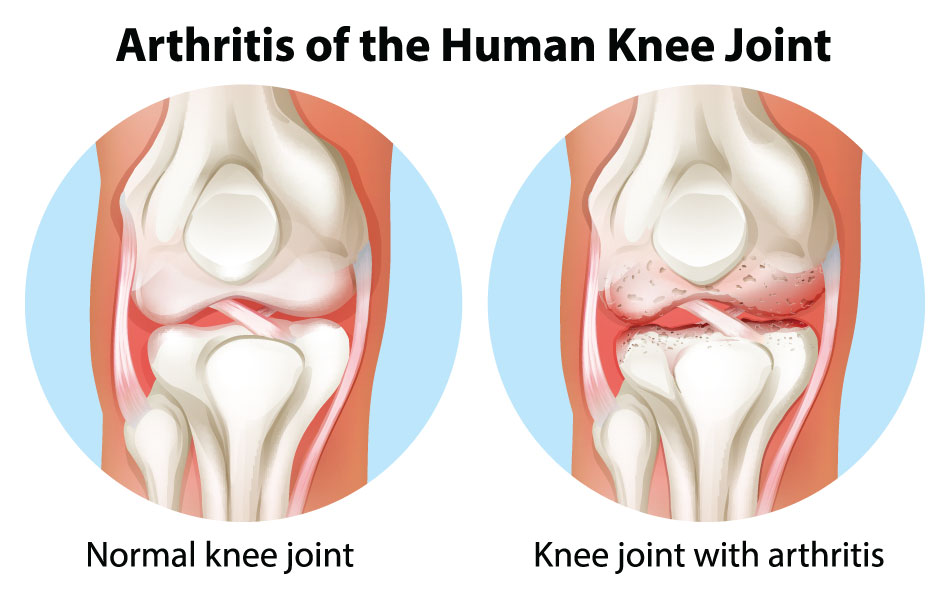What Is Psoriatic Knee Arthritis?
Psoriatic arthritis (PsA) is an autoimmune disease that affects up to 30% of individuals with psoriasis (National Psoriasis Foundation, 2023). When it targets the knees, it leads to inflammation, pain, and damage in one or both knee joints.
Unlike osteoarthritis, which is caused by wear and tear, psoriatic knee arthritis stems from immune system dysfunction, causing the body to attack healthy joint tissues.
Common Symptoms of Psoriatic Knee Arthritis
Recognizing the symptoms early is crucial for effective treatment. Look for the following:
Key Symptoms to Watch For
-
Knee joint pain that worsens with activity and eases with rest
-
Swelling and stiffness, especially after periods of inactivity
-
Warmth or redness around the knee
-
Reduced range of motion or difficulty bending and straightening the knee
-
Morning stiffness that lasts longer than 30 minutes
-
Fatigue or feeling generally unwell
Approximately 40-50% of PsA patients experience enthesitis—pain at tendon and ligament insertion points—which often occurs around the kneecap (Mayo Clinic, 2023).
How Is Psoriatic Knee Arthritis Diagnosed?
A diagnosis usually involves a mix of physical exams, lab tests, and imaging:
Diagnostic Steps
-
Medical History: Including a history of psoriasis or family history of arthritis.
-
Physical Examination: Doctors assess joint swelling, tenderness, and range of motion.
-
Blood Tests: Check for inflammatory markers like ESR and CRP.
-
X-rays or MRIs: Reveal joint erosion or soft tissue inflammation.
-
Rheumatoid Factor Test: Helps rule out other autoimmune diseases like rheumatoid arthritis.
Treatment Options for Psoriatic Knee Arthritis
There’s no cure for psoriatic arthritis, but its symptoms can be controlled effectively. Treatment depends on severity, lifestyle, and medical history.
Medication-Based Treatments
-
NSAIDs (e.g., ibuprofen): For mild inflammation and pain relief
-
DMARDs (Disease-Modifying Antirheumatic Drugs) like methotrexate: To slow joint damage
-
Biologics (TNF inhibitors such as etanercept or adalimumab): Target specific immune responses
-
Corticosteroid Injections: For quick relief during flare-ups
Biologic therapies have shown significant success, with some patients experiencing up to 70% symptom reduction after 6 months of consistent use (Arthritis Foundation, 2022).
Non-Pharmacological Treatments
-
Physical Therapy: Improves joint function and reduces stiffness
-
Weight Management: Every extra pound adds pressure to the knees
-
Exercise: Low-impact workouts like swimming or cycling can boost mobility
-
Diet: Anti-inflammatory foods like leafy greens, salmon, and berries can help reduce flare-ups
When to See a Specialist
If you notice persistent joint pain along with a history of psoriasis, consult a rheumatologist—a doctor specializing in autoimmune and inflammatory diseases.
Top Experts to Consult
-
Rheumatologist: For diagnosis and long-term management
-
Orthopedic Specialist: For severe joint damage or surgical options
-
Dermatologist: To manage concurrent psoriasis symptoms
-
Physical Therapist: For rehabilitation and mobility improvement
Getting a multidisciplinary care team ensures comprehensive treatment—managing both skin and joint symptoms effectively.
Living with Psoriatic Knee Arthritis
Chronic pain doesn’t have to mean giving up your life. People living with psoriatic arthritis have found that the right mix of medication, movement, and medical guidance can dramatically improve their quality of life.
If you’re feeling isolated or unsure, join a local or online support group. Speaking with others who share your journey can be incredibly validating and inspiring.
Final Thoughts: Take Action for Your Joint Health
Psoriatic knee arthritis may be persistent, but it’s manageable with the right care. Recognizing the symptoms early, exploring treatment options, and partnering with specialists are your first steps toward long-term relief.
👉 Don’t wait for pain to define your days—consult a rheumatologist today and take control of your joint health.

